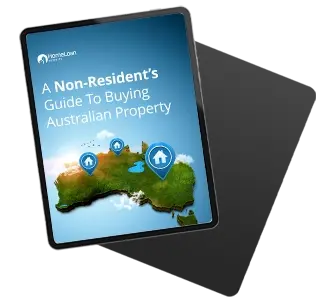What is the 482 Visa?
The 482 visa, or the Temporary Skill Shortage (TSS) visa, is a temporary work visa in Australia. It has different streams, including short-term and medium-term options, each with varying processing times and validity periods.
In April 2017, the Australian government announced that it would be abolishing the 457 visa scheme in favour of the Temporary Skill Shortage (TSS) working visa.
How much can you borrow?
Getting approved while on a TSS visa (subclass 482) will depend on the lender and what stream you’re working under.
As a general rule:
- Medium-Term or MLTSSL stream (4 years): Borrow up to 90% of the property value as a special exception to standard lending policy with a couple of our lenders.
- Short-Term or STSOL stream (1-2 years): Borrow up to 80% of the property value with one of our lenders.
- Married or defacto with an Australian citizen or permanent resident (PR): Borrow up to 95% of the property value if your partner is an Australian citizen or permanent resident (PR) visa holder.
- Visa expiry: As a general rule, your visa must have over 12 months remaining, however, there are some exceptions.
- Medical professionals: If you’re a doctor or medical professional you may qualify for significantly reduced interest rates and waived Lenders Mortgage Insurance (LMI).
- Legal professionals: If you’re a lawyer or barrister you may qualify for reduced interest rates and waived LMI.
There has been a lot of changes to temporary resident lending policy in recent years.
The 482 visa came into effect in March 2018 and is the next development that new migrants need to understand when migrating to Australia.
If you were currently working under a Temporary Business (long stay) 457 visa or another temporary visa and have since switched to the TSS visa regime, give us a call on 1300 889 743 or complete our free assessment form today.
We’ll let you know if you qualify for a mortgage.
Will I be hit with a high interest rate?
Although there are only a few lenders operating in this space, TSS visa holders won’t necessarily have to pay a higher interest rate just because they’re on a temporary visa.
In fact, you may qualify for significant home loan fee discounts and special interest rates that are way below the Bank Standard Variable (BSV) rate.
That’s right!
As long as you’re in a good financial position, with a stable job and a good deposit, you’re potentially eligible for the same discounts as an Australian citizen!
If you’re applying for a smaller amount then you can still qualify for a competitive basic mortgage.
We can help you put together a strong mortgage application with the right lender.
Own a Home on a TSS Visa
Find out how you can get a home loan with a 482 visa. Take the first step toward your dream home.
Apply nowCan I get the First Home Owners Grant (FHOG)?
Unfortunately, FHOG or your state’s equivalent and other government homebuyer benefits aren’t available to TSS visa holders and other temporary workers.
The exception is if you’re buying jointly with an Australian citizen or permanent resident.
Give yourself the best chance at approval
If you’re currently on a temporary working visa, you won’t be affected by the introduction of the 482 visa scheme.
However, non-resident lending policies are still complicated so it helps if you have a mortgage broker to assist you choose the right lender.
You’re more likely to get approved if:
- You have at least a year remaining on your visa.
- Most of your savings are already in Australia.
- You have stable employment in a sought after profession.
If you’ve landed on this page from outside of Australia and you’re considering applying for a skilled migration visa prior to March 2018, be aware that the introduction of the TSS scheme has affected the occupations list.
Check out the Medium and Long-Term Strategic Skills List (MLTSSL) here.
For the Short-Term Skilled Occupation List (STSOL), please visit the Department of Immigration and Border Protection website (formerly the Department of Immigration and Citizenship).
Buying A Home in Australia As A Non-Resident
Everything you need to know as a non-resident buying a property in Australia.

How big of a deposit do I need?
If you’ve spoken to a mortgage broker recently or even your own bank, they may have told you that you can only borrow up to 80% of the property value as a temporary worker.
Not all lenders are the same and most brokers don’t have experience working with temporary residents.
Luckily, we’re experts in getting mortgages approved for temporary residents, foreign citizens and other non-residents.
We’ve even made special arrangements with our lenders so you can borrow up to 90% of the property value.
What that means for you is a smaller deposit!
To explain, you’ll typically need around 18% of the purchase price to cover the deposit, stamp duty (state government tax) and LMI, a one off fee charged when borrowing over 80% of the property value.
So for a $600,000 property, you’ll need around $108,000 to cover the deposit and all of the purchase costs.
If you were to borrow at 80%, you’d need around $168,000 or $60,000 more!
Call 1300 889 743 or complete our free assessment form to find out how much you can borrow.
Beware of the stamp duty surcharge
Late last year, the Government introduced a stamp duty surcharge for temporary residents and 457 visa holders in an effort to ease property investing by foreigners.
This surcharge will apply to the forthcoming TSS visa scheme.
The extra duty varies from state to state, ranging from 3% to 7% of the land value.
For example, for an $800,000 property in New South Wales, the total cost of stamp duty was previously $31,490.
It is now $63,490!
Can you avoid the surcharge?
For new migrants planning to make Australia their new home, it hardly seems fair that they should be charged a stamp duty surcharge, particularly if they’re buying an owner-occupied property.
If you’re married or in a spousal relationship with an Australian citizen, buying under their name as joint tenants is one way to avoid the surcharge.
The second way is to buy in an Australian state that doesn’t apply the surcharge.
At the moment, only New South Wales (NSW), the Australian Capital Territory (ACT), Victoria (VIC), South Australia (SA), Western Australia (WA) Queensland (QLD) apply the extra stamp duty.
You could instead buy a property in:
- Tasmania (TAS).
- Northern Territory (NT).
Finally, if you’re only a year or less away from getting PR, you could simply wait in order to avoid the surcharge and save thousands.
The benefit of the last option is that you’ll be able to qualify with more lenders and qualify for even more home loan deals.
Do I need government approval to buy property?
TSS visa mortgages are available if you choose the right lender.
By presenting a strong case, you can even qualify for significantly reduced interest rates and other home discounts.
We have helped thousands of temporary Australian residents on the following visa types:
- Investor Retirement Visa (Subclass 405)
- Temporary Business (Long Stay) – Standard Business Sponsorship (Subclass 457)
- Foreign Government Agency Visa (Subclass 415)
- Domestic Workers Visa (Subclass 426)
- Diplomats Visa (Subclass 995)
- Medical Practitioner (Temporary) Visa (Subclass 422)
Please call us on 1300 889 743 or complete our free assessment form to speak with one of our specialist mortgage brokers about your situation.
TSS visa mortgages are available if you choose the right lender.
By presenting a strong case, you can even qualify for significantly reduced interest rates and other home discounts.
We have helped thousands of temporary Australian residents on the following visa types:
- Investor Retirement Visa (Subclass 405)
- Temporary Business (Long Stay) – Standard Business Sponsorship (Subclass 457)
- Foreign Government Agency Visa (Subclass 415)
- Domestic Workers Visa (Subclass 426)
- Diplomats Visa (Subclass 995)
- Medical Practitioner (Temporary) Visa (Subclass 422)
Please call us on 1300 889 743 or complete our free assessment form to speak with one of our specialist mortgage brokers about your situation.
What happened to the 457 visa?
TSS visa mortgages are available if you choose the right lender.
By presenting a strong case, you can even qualify for significantly reduced interest rates and other home discounts.
We have helped thousands of temporary Australian residents on the following visa types:
- Investor Retirement Visa (Subclass 405)
- Temporary Business (Long Stay) – Standard Business Sponsorship (Subclass 457)
- Foreign Government Agency Visa (Subclass 415)
- Domestic Workers Visa (Subclass 426)
- Diplomats Visa (Subclass 995)
- Medical Practitioner (Temporary) Visa (Subclass 422)
Please call us on 1300 889 743 or complete our free assessment form to speak with one of our specialist mortgage brokers about your situation.
Discover if you qualify for a mortgage
TSS visa mortgages are available if you choose the right lender.
By presenting a strong case, you can even qualify for significantly reduced interest rates and other home discounts.
We have helped thousands of temporary Australian residents on the following visa types:
- Investor Retirement Visa (Subclass 405)
- Temporary Business (Long Stay) – Standard Business Sponsorship (Subclass 457)
- Foreign Government Agency Visa (Subclass 415)
- Domestic Workers Visa (Subclass 426)
- Diplomats Visa (Subclass 995)
- Medical Practitioner (Temporary) Visa (Subclass 422)
Please call us on 1300 889 743 or complete our free assessment form to speak with one of our specialist mortgage brokers about your situation.
[sg_popup id=65221]
